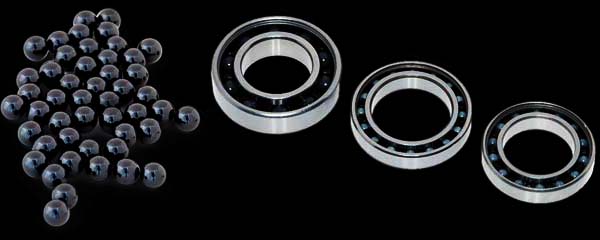Ceramic ball bearing

Ceramic ball bearing (ZrO2) and (Si3N4)
- Per saperne di più sui cuscinetti utilizzati per lo skiroll
- Come vengono costruiti i cuscinetti a sfere
CERAMIC BEARINGS
Ceramic is the new Holy Grail! Its lighter, smoother, stiffer, harder, corrosion resistant, and electrically resistant. These fundamental characteristics allow for a wide range of performance enhancements in bearings. Ceramic bearings dissipate heat quickly, reducing friction and wear while maintaining a precision smooth surface. Today's leading edge ceramics are made with Silicon Nitride (Si3N4) and have characteristics similar to the heat absorbing, highly resilient tiles on the Space Shuttle.
ZrO2: White Color - (Zirconia)
Si3N4: Black Color - (Silicon nitride)
There are two kinds of ball materials: Silicon nitride, we always call it Si3N4 or black ball(its black color). Another is Zirconia, we call it ZrO2 or white ball(its white color). The density of silicon nitride is 3.20 g/cm3 lower than Zirconia (3.96 g/cm3) or chrome steel(7.85 g/cm3).For this reason, the ceramic rolling element can effectively restrain the centrifugal force generated by high-speed rotation and reduce the load of rolling element. Meanwhile, it can also reduce the rotational slide between the rolling element and the raceway surface and thus prevent surface damage. So, it can be widely used in bearings.
Ceramic hybrids are a mixture of steel races and ceramics balls. The most common ceramic ball used, because of its hardness, is the Silicon Nitride (Si3N4) ball, although in certain environments either Zirconia (ZrO2) or Alumina Oxide (Al2O3) can be used. Ceramic hybrids offer higher RPMs due to the nonporous ball surface, longer life due to having a greater Rockwell hardness than steel and decreased weight as a result of being 2/3 the weight of steel. Ceramic hybrids are ideally suited to any application looking to achieve increased speed, durability and heat
dissipation.
Full ceramic bearings are best suited to extreme operating environments where traditional steel bearings fail. The two main ceramic components used are Silicon Nitride (Si3N4) and Zirconia (ZrO2). Ceramic is impervious to most solutions, it is non magnetic, non conductive and capable of absorbing high temperatures up to 1,0000C. Full ceramic bearings are highly recommended for vacuum type environment as well as high heat and caustic solution applications. Performance racing applications also see great benefit by using full ceramic bearings in certain components. Little or no lubrication is needed due to the non-porous nature of full ceramic races and balls.



